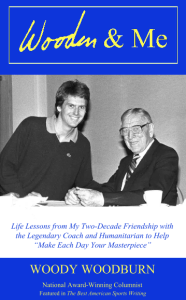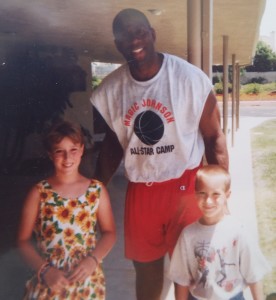My new memoir WOODEN & ME is also available here at Amazon
* * *
Backboard to Boardroom, He’s Magic
It was the littlest of things, yet it remains an indelible memory more than a quarter century later. A small gesture of gracefulness telling a bigger story.
I was in the Los Angeles Lakers’ locker room as a rookie writer. It was after the game and reporters were boxing one another out around Magic Johnson’s locker stall like players battling for rebound position.
As the scrum of scribes and TV cameras thinned, I moved forward and finally asked a question to which Magic prefaced his answer: “Well, Woody… ”
Understand, I was not a familiar beat writer. Rather, this was my first time covering a Lakers game. But Magic had the grace to slyly spy the name on my media credential and made me feel welcomed.
Truth is, Magic made every media member feel welcomed – and made our working lives much easier.
Unlike Kareem Abdul-Jabbar, who would escape to the showers without talking, or Shaq O’Neal, who seemed to delight in mumbling so we couldn’t hear what he was saying, Magic would sit at his locker and thoughtfully answer each and every question until the very last reporter had what he or she needed.
I had the good fortune to interview Magic many more times during the final few years of his playing career and also enjoyed a couple lengthy one-on-one conversations with him at his youth basketball camps at Cal Lutheran University after he retired. Every encounter was a pleasure.
For good reason when people ask me who my favorite person to interview has been, the first name I mention after John Wooden is Magic Johnson.
So when the basketball legend-turned-mogul entrepreneur was a guest speaker not long ago as part of UC Santa Barbara’s Arts & Lectures series at the Arlington Theatre, I had to be there.
I’m glad I was. I have seen many wonderful speakers on stage – including Maya Angelou, Malcolm Gladwell and the Dalai Lama – and Magic was second to none.
He also did something unique – he ignored the lectern, eschewed a chair, and in fact shunned the stage entirely. Instead, in theatric terms he “broke the fourth wall” and gave his nearly two-hour-long talk from the floor in front of the stage as well as intimately walking up and down the aisles.
After recounting how he and his strapped college dorm mates would clip coupons and pool their money to buy one large pizza and sodas to share, Magic thoughtfully walked to the back of the auditorium to address the UCSB students who suddenly went from being in the cheap seats to having a front-row view.
Along the way, Magic’s extra dose of “charisma” DNA was evident as he stopped and talked – and posed for snapshots – with a handful of audience members. An hour later – reminiscent of my long-ago locker room encounter – he addressed a couple of these same strangers by first name.
Magic has treated F. Scott Fitzgerald’s famous declaration, “There are no second acts in American lives,” like a backpedaling defender. He faked it out and scored. Impossibly, Magic has been as successful in the business boardroom as fast-breaking between the backboards.
A tweet-length post-NBA summary in 140 characters: Part owner of the Dodgers; owner of movie theaters, Starbucks, 24 Hour Fitness and Burger King franchises serving urban areas; philanthropist; HIV/AIDS activist.
Directing his wisdom directly to the “young people” in the Santa Barbara audience, Magic, now 55, encouraged them get an education, find mentors, and dream big.
“I was a student-athlete who went to class,” he shared.
“People helped me along the way so I need to help others.”
“I was poor, but I didn’t dream poor.”
Further advice for success in the business world, and life, included: “Respect people’s time”; “always be early”; and “over-deliver.”
“I want you to over-deliver to everybody; your parents; your professor,” Magic concluded. “That’s what we all have to do now. It’s not enough just to deliver anymore. You have to over-deliver.”
It was not lip service: Magic was scheduled to speak for an hour and a half but graciously over-delivered by 20 minutes.
Happily, some things never change.
* * *
Woody Woodburn writes a weekly column for The Ventura County Star and can be contacted at WoodyWriter@gmail.com.
 Check out my new memoir WOODEN & ME: Life Lessons from My Two-Decade Friendship with the Legendary Coach and Humanitarian to Help “Make Each Day Your Masterpiece”
Check out my new memoir WOODEN & ME: Life Lessons from My Two-Decade Friendship with the Legendary Coach and Humanitarian to Help “Make Each Day Your Masterpiece”
- Personalized signed copies are available at WoodyWoodburn.com
- Unsigned paperbacks or Kindle ebook can be purchased here at Amazon


